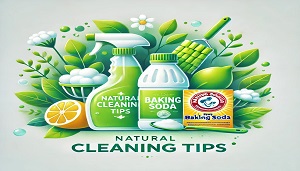A clean and organized home is not only visually appealing but also crucial for your health and well-being. Unfortunately, many conventional cleaning products contain harsh chemicals that can be harmful to both the environment and your family. The good news is that nature offers a variety of powerful, non-toxic alternatives that are just as effective and often more budget-friendly! In this blog, we’ll share 10 Natural House Cleaning Tips to help you maintain a spotless, eco-friendly, and safe home for everyone. Let’s explore the world of natural cleaning solutions!
1. Baking Soda as a Universal Cleaner
Baking soda is a true champion of natural cleaning. Its gentle abrasive qualities make it ideal for scrubbing surfaces without causing any damage. You can use baking soda to clean kitchen counters, sinks, and even greasy stovetops.
Quick Tip: Make a paste by mixing baking soda with water. Apply it to tough stains or grime, let it sit for 15 minutes, and then scrub gently with a sponge.
Additional Use: Sprinkle baking soda on carpets and upholstery to eliminate odours. Allow it to sit for 30 minutes before vacuuming.
2. White Vinegar for Sparkling Surfaces
White vinegar is a natural powerhouse that effectively cuts through grease, removes mineral deposits, and disinfects surfaces. It’s great for cleaning glass, countertops, and even floors.
DIY Vinegar Spray Recipe: Mix equal parts white vinegar and water in a spray bottle. If you’re not fond of the vinegar smell, add a few drops of essential oil.
Quick Tip: Use vinegar to descale your coffee maker or kettle by running a vinegar-water solution through the appliance, followed by plain water to rinse.
3. Lemon for a Fresh and Sanitized Home
Lemons aren’t just for lemonade! Their natural acidity and antibacterial properties make them excellent cleaning agents. They effectively cut through grease, sanitize surfaces, and leave your home smelling fresh.
Quick Tip: To remove stains and odours from cutting boards, rub a cut lemon over the surface. For added scrubbing power, sprinkle some salt on top.
Additional Use: To freshen up your sink, toss lemon peels into your garbage disposal and run it for a few seconds to eliminate odours.
4. Olive Oil for Furniture Polishing
Olive oil is not just for cooking; it also serves as a fantastic natural polish for wooden furniture. When mixed with lemon juice, it nourishes the wood and provides a lovely shine.
DIY Furniture Polish Recipe: Mix 1/4 cup of olive oil with 1/4 cup of lemon juice. Dip a soft cloth into the mixture and gently rub it on the wood. Finish by buffing with a dry cloth for a polished look.
5. Salt as a Natural Abrasive
Salt is a simple yet effective abrasive for tough cleaning jobs. It’s especially effective for scrubbing cutting boards, pans, and stovetops.
Quick Tip: For burnt pans, sprinkle salt on the surface, add a little water, and scrub with a sponge. The salt helps lift stubborn residue without scratching.
Bonus Use: Mix salt and lemon to clean and shine metal surfaces, such as brass or copper.
6. Essential Oils for Fresh Scents and Disinfection
Essential oils aren’t just for aromatherapy; they can also improve your cleaning habits. Oils like tea tree, lavender, and eucalyptus have antimicrobial qualities, making them fantastic disinfecting agents.
DIY All-Purpose Cleaner: Add 10-15 drops of your preferred essential oil to a spray bottle filled with water and a tablespoon of vinegar. This blend is effective for cleaning surfaces.
Quick Tip: For a natural fabric freshener, add a few drops of lavender oil to your laundry.
7. Cornstarch for Cleaning Windows and Carpets
Cornstarch is an unexpected but effective natural cleaning agent. It’s great for getting streak-free windows and can help soak up grease stains on carpets.
Quick Tip: Mix 1 tablespoon of cornstarch with one cup of warm water to make a natural window cleaner. Use a cloth to apply it, then wipe it off with newspaper for a streak-free shine.
Bonus Use: Sprinkle cornstarch on carpet stains, let it sit for 15 minutes, and then vacuum it up thoroughly.
8. Hydrogen Peroxide for Tough Stains
Hydrogen peroxide acts as a natural bleach alternative, making it ideal for removing tough stains from grout, tile, and even laundry.
Quick Tip: Dip a toothbrush in hydrogen peroxide and scrub the grout lines. Let it sit for 10 minutes before rinsing with water.
Additional Use: Mix hydrogen peroxide with baking soda to make a powerful stain remover for your clothing.
9. Natural Cleaning with Castile Soap
Castile soap is a versatile and biodegradable option that is both gentle and effective for cleaning. It is perfect for washing dishes, mopping floors, and cleaning bathrooms.
DIY Castile Soap Cleaner: Mix one tablespoon of castile soap with one gallon of warm water for an all-purpose cleaner. Add a few drops of essential oil for fragrance
Quick Tip: Use diluted castile soap to safely clean your makeup brushes and sponges.
10. DIY Cleaning Wipes and Solutions
Why spend money on disposable cleaning wipes when you can easily make your own reusable wipes? They’re eco-friendly, affordable, and customizable.
DIY Cleaning Wipes Recipe:
Cut old t-shirts or towels into small squares.
Soak them in a mixture of water, vinegar and essential oils.
Store in an airtight container and use when needed.
Quick Tip: Wash and reuse the wipes to reduce wastage.
Conclusion
Natural cleaning methods not only help you save money but also protect your health and the environment. By incorporating these tips into your routine, you can have a spotless, safe and eco-friendly home. Start by replacing a chemical cleaner with a natural alternative, and watch the positive changes in your cleaning habits.
We’d love to hear in the comments what natural cleaning tip you want to try, or feel free to share your favourite natural cleaning hack!
FAQ
Q1: Are natural cleaning products as effective as chemical cleaners?
Answer: Yes! Natural cleaning products like baking soda, vinegar, and hydrogen peroxide work well for most cleaning tasks. They might take a little longer on some tough stains, but they are safer and good for the environment.
Q2: Can I use these natural cleaners on all surfaces?
Answer: Most natural cleaners are quite versatile, but it’s always a good idea to test them on a small, hidden area first, especially on delicate surfaces like marble or granite.
Q3: Do natural cleaning methods save money?
Answer: Absolutely! Ingredients like vinegar, baking soda, and lemon are inexpensive and often found in your kitchen.
Q4: How do I store homemade cleaning solutions?
Answer: Store your DIY cleaners in clean, labelled spray bottles or airtight containers. Store these in a cool, dry place out of direct sunlight.
Q5: Can essential oils be harmful?
Answer: Essential oils are generally safe, but some can be quite strong. Always dilute them properly and make sure they are out of reach of children and pets.

I’m Chiranjib Dhal, a passionate tech blog writer, software developer, and the creator of Top10Buzz. With a love for lists and a knack for technology, I’m here to bring you captivating top 10 lists across various categories. Join me on this journey to discover the world’s top picks and tech trends.

